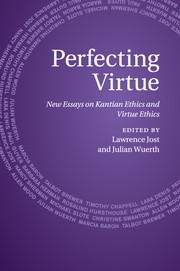Book contents
- Frontmatter
- Contents
- Notes on contributors
- Acknowledgements
- List of abbreviations
- Introduction
- 1 Virtue ethics in relation to Kantian ethics: an opinionated overview and commentary
- 2 What does the Aristotelian phronimos know?
- 3 Kant and agent-oriented ethics
- 4 The difference that ends make
- 5 Two pictures of practical thinking
- 6 Moving beyond Kant's account of agency in the Grounding
- 7 A Kantian conception of human flourishing
- 8 Kantian perfectionism
- 9 Aristotle, the Stoics, and Kant on anger
- 10 Kant's impartial virtues of love
- 11 The problem we all have with deontology
- 12 Intuition, system, and the “paradox” of deontology
- Bibliography
- Index
6 - Moving beyond Kant's account of agency in the Grounding
Published online by Cambridge University Press: 04 February 2011
- Frontmatter
- Contents
- Notes on contributors
- Acknowledgements
- List of abbreviations
- Introduction
- 1 Virtue ethics in relation to Kantian ethics: an opinionated overview and commentary
- 2 What does the Aristotelian phronimos know?
- 3 Kant and agent-oriented ethics
- 4 The difference that ends make
- 5 Two pictures of practical thinking
- 6 Moving beyond Kant's account of agency in the Grounding
- 7 A Kantian conception of human flourishing
- 8 Kantian perfectionism
- 9 Aristotle, the Stoics, and Kant on anger
- 10 Kant's impartial virtues of love
- 11 The problem we all have with deontology
- 12 Intuition, system, and the “paradox” of deontology
- Bibliography
- Index
Summary
INTRODUCTION
If there is one criticism that has come to define virtue ethicists' opposition to Kant's ethics in recent years, it is that Kant's ethics is concerned with actions, not agents. As some of the other essays in this volume make clear, this complaint reflects an overemphasis on the part of many of Kant's defenders and detractors alike on just one of Kant's works in ethics, his Grounding of the Metaphysics of Morals, with its focus on the application of the categorical imperative to maxims regarding individual, isolated actions. When we turn to Kant's other recorded thought, as is increasingly common, we find Kant going beyond these discussions to discussions of broader duties to develop our agency. And here Kant underscores not just the importance of cultivating our capacity for cognition but also our capacity for feeling, our capacity for desiring, and our strength of will.
But addressing the virtue ethicists' challenge to Kant's ethics is not as simple as supplementing a text focused on isolated actions in the Grounding with these other accounts describing broader duties to our own agency. The problem is that, just as the Grounding has little to say about broader duties to our agency, so too does it have little to say about agency at all, and, most importantly, to the extent it does say something about agency, generally says vague things that have been widely misconstrued to imply an account of agency incompatible with Kant's other, supplemental accounts of broader duties to our own agency.
Keywords
- Type
- Chapter
- Information
- Perfecting VirtueNew Essays on Kantian Ethics and Virtue Ethics, pp. 147 - 163Publisher: Cambridge University PressPrint publication year: 2011
- 20
- Cited by

